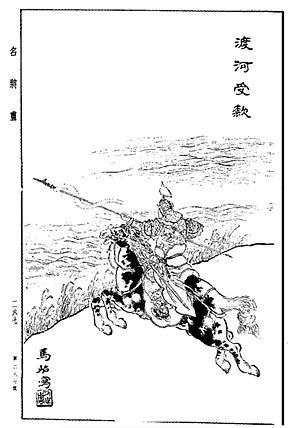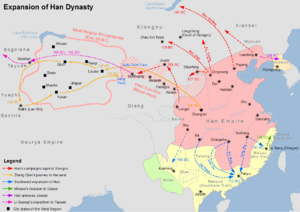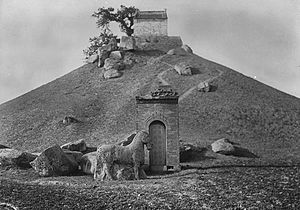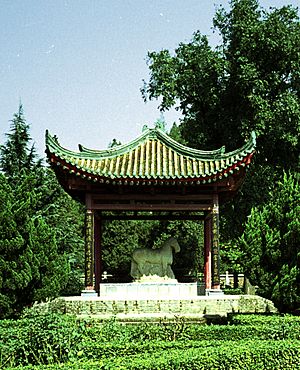Huo Qubing facts for kids
Quick facts for kids
Huo Qubing
霍去病 |
|
|---|---|
 |
|
| Born | 140 BC Linfen, Shanxi
|
| Died | 117 BC (aged 23) |
| Other names | Marquis Jinghuan of Champion (冠军景桓侯) |
| Occupation | Military general, politician |
| Children | Huo Shan |
| Parents |
|
| Relatives | Huo Guang (half-brother) |
Huo Qubing (born 140 BC – died 117 BC) was a famous Chinese military general. He lived during the Western Han dynasty and served under Emperor Wu of Han. Huo Qubing was the nephew of the respected general Wei Qing and Empress Wei Zifu, who was Emperor Wu's wife. He was also the half-brother of the important government official Huo Guang.
Huo Qubing, along with Wei Qing, led major military missions. They traveled into the Gobi Desert in what is now Mongolia. Their goal was to defeat the Xiongnu, a group of nomadic people. Huo Qubing won many important battles, including the Battle of Mobei in 119 BC. His victories helped shape the history of ancient China.
Contents
Huo Qubing's Early Life
Huo Qubing's mother was Wei Shaoer. She was the daughter of a maid who worked for Princess Pingyang, Emperor Wu's older sister. His father was Huo Zhongru, a government worker. Huo Zhongru did not stay with Wei Shaoer, so she raised Huo Qubing with help from her family.
When Huo Qubing was about two years old, his aunt, Wei Zifu, became important. She was a singer and dancer for Princess Pingyang. Emperor Wu noticed her and brought her and her half-brother, Wei Qing, to his palace. Wei Zifu later became pregnant with Emperor Wu's first child. This made the Empress at the time, Empress Chen Jiao, very jealous.
Empress Chen's mother tried to harm Wei Qing. But Wei Qing was saved by other palace guards. Because of this, Emperor Wu promoted Wei Zifu to a high position. He also gave Wei Qing important roles, making him one of his closest helpers. The rest of the Wei family, including Huo Qubing's mother, also received rewards. Thanks to his family's rising status, young Huo Qubing grew up in a wealthy and respected environment.
Huo Qubing's Military Career
Huo Qubing showed amazing military skills even when he was a teenager. Emperor Wu saw his potential and made Huo his personal assistant.
In 123 BC, Emperor Wu sent Wei Qing to fight the Xiongnu. He made the 18-year-old Huo Qubing a Captain under his uncle. This was Huo's first real battle. Wei Qing's army killed or captured many Xiongnu soldiers. However, a part of his army was defeated.
Huo Qubing, however, stood out. He led 800 light cavalry soldiers on a long mission. They killed over 2,000 enemy troops and captured many Xiongnu leaders. Emperor Wu was very impressed. He made Huo Qubing the Marquess of Champion. This gave him control over a large area of land and people.
Victories in the Hexi Corridor
In 121 BC, Emperor Wu sent Huo Qubing to fight the Xiongnu twice. These battles took place in the Hexi Corridor. In the spring, Huo Qubing led 10,000 cavalry. They rode through five kingdoms in just six days. They traveled over 1,000 li (about 400 miles) past Mount Yanzhi. His forces killed two Xiongnu princes and nearly 9,000 enemy soldiers. They also captured a special golden statue used in Xiongnu rituals. For this victory, his land was increased.
In the summer of the same year, Xiongnu attacked other areas. Huo Qubing set out with over 10,000 cavalry. He traveled over 2,000 li (about 800 miles) without backup. He reached the Qilian Mountains. There, he killed over 30,000 Xiongnu soldiers. He also captured many Xiongnu princes. His land was increased even more for this victory.
Huo Qubing's wins greatly weakened the Xiongnu tribes in the Hexi Corridor. The Xiongnu leader, Yizhixie Chanyu, wanted to punish his princes for these losses. One Xiongnu prince decided to surrender to the Han government. When the Xiongnu tribes came to meet the Han forces, some of their soldiers rioted. Huo Qubing bravely went alone into the Xiongnu camp. He ordered the prince to calm his men. He then stopped 8,000 Xiongnu who refused to surrender.
The surrender of these Xiongnu tribes was a huge win for the Han Dynasty. It gave them control over the Western Regions. This also opened up the Northern Silk Road, allowing trade with Central Asia. The Han army also gained access to high-quality horses from Central Asia. Emperor Wu then built five new areas and a fortified wall along the Hexi Corridor. He settled 700,000 Chinese soldiers and their families there.
The Battle of Mobei
After many defeats, the Xiongnu leader retreated north of the Gobi Desert. He hoped the empty land would protect them. But Emperor Wu planned a huge attack in 119 BC. The Han army was split into two main groups. Each had 50,000 cavalry and over 100,000 foot soldiers. Wei Qing and Huo Qubing were the supreme commanders.
Emperor Wu favored Huo Qubing and gave him the best soldiers. The original plan was for Huo Qubing to attack the Xiongnu leader directly. Wei Qing would support him by attacking another Xiongnu prince. However, a Xiongnu prisoner gave false information. He said the Xiongnu leader was in the east. So, Emperor Wu changed the plan. Wei Qing went west, and Huo Qubing went east.
The battles in the east were easy for Huo Qubing. His forces were much stronger than the enemy. Huo Qubing traveled over 2,000 li and quickly defeated the Xiongnu prince. He killed over 70,000 enemy soldiers and captured many leaders. He then performed special ceremonies at the Khentii Mountains to celebrate the Han victory. He continued chasing the Xiongnu as far as Lake Baikal. This completely destroyed that Xiongnu clan. Another Han army joined Huo Qubing, and they returned victorious. This win earned Huo Qubing even more land and made him more famous than his uncle, Wei Qing. Many commanders wanted to serve under Huo Qubing.
Huo Qubing's Death and Legacy
Emperor Wu offered to help Huo Qubing find a wife. But Huo Qubing famously replied, "The Xiongnu are not yet eliminated, why should I start a family?" This statement became a famous Chinese patriotic saying.
Huo Qubing was known for being quiet. However, he was not always humble. Historical records say he did not always share his food with his soldiers. He also made them play games even when they were low on supplies. When Emperor Wu suggested he study military books, Huo Qubing said he already understood war strategies. He also showed strong loyalty to his uncle. When a subordinate attacked Wei Qing, Huo Qubing shot that person during a hunting trip. Emperor Wu covered for him, saying the person was "killed by a deer."
Huo Qubing was also known for his generosity in victory. One story says that Emperor Wu gave him a jar of valuable wine. Huo Qubing poured it into a creek so all his men drinking the water could share it. This gave the city of Jiuquan its name, which means "wine spring."
Huo Qubing died in 117 BC at the young age of 23. Emperor Wu was very sad. He ordered elite troops to line up from Chang'an to Maoling. Huo Qubing's tomb was built there, shaped like the Qilian Mountains. This was to honor his military achievements. He was given the title Marquess of Jinghuan. A large stone statue called "Horse Stomping Xiongnu" was placed in front of his tomb.
Huo Qubing is considered one of the most successful military commanders in Chinese history. His half-brother, Huo Guang, later became a very important government official. He helped guide the next emperors.
Huo Qubing's son, Huo Shan, became Marquess after him but died young. So, Huo Qubing's title ended. Later, some of his relatives were involved in a plot against the emperor. This led to their deaths and the end of that part of the Huo family line.
Huo Qubing in Popular Culture
- Huo Qubing appears as a special character in the video game Romance of the Three Kingdoms XI.
- He was played by Li Junfeng in the 2005 TV series The Emperor in Han Dynasty.
- Eddie Peng played a character based on Huo Qubing in the Chinese drama Sound of the Desert.
- Huo Qubing is also mentioned in the film Dragon Blade. The main character, played by Jackie Chan, was said to have been raised by him. Actor Feng Shaofeng portrays the general in short flashbacks.
See also
 | Sharif Bey |
 | Hale Woodruff |
 | Richmond Barthé |
 | Purvis Young |




